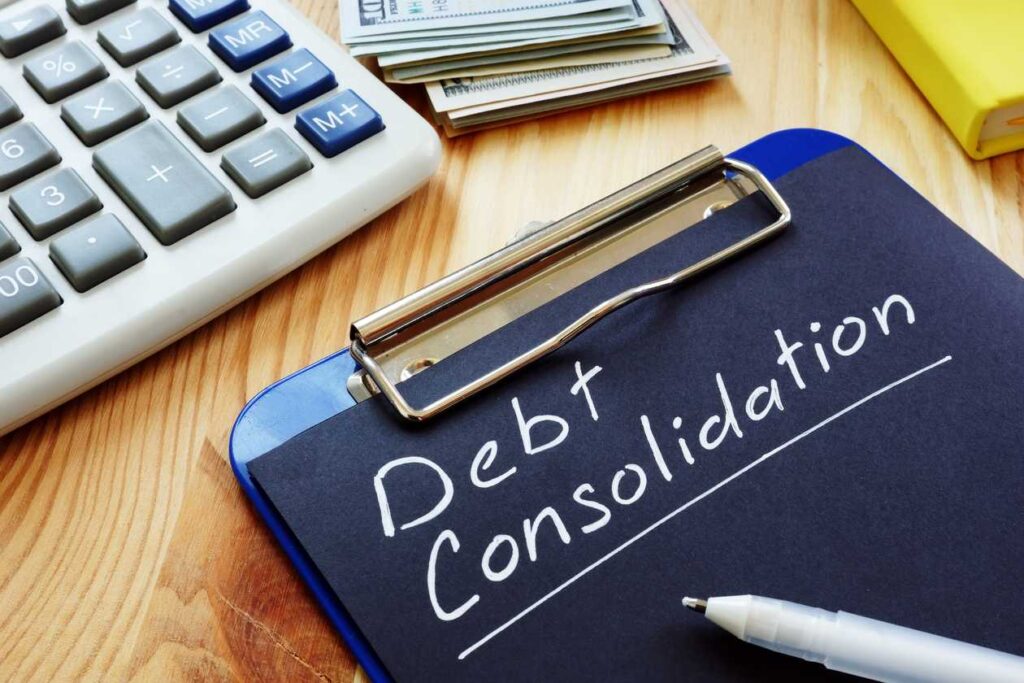If you find it difficult to repay multiple debts at once, debt consolidation could be a viable option. Debt consolidation is a helpful approach to managing your payments, as long as you have a clear understanding of its advantages, disadvantages, and the potential effects it may have on your credit scores.
Read More:
- What is Errors & Omissions (E&O) Insurance
- What is General Liability Insurance
- What is Restaurant Insurance
What Is Debt Consolidation

Debt consolidation is a process that combines multiple debts, particularly those with high-interest rates like credit card bills, into one convenient payment.
Opting for debt consolidation can be beneficial if you can secure a lower interest rate compared to what you are currently paying.
This enables you to effectively reduce your overall debt and restructure it, ultimately allowing you to pay it off more quickly.
How Debt Consolidation Works
Debt consolidation involves combining multiple existing debts into a single new debt. There are various methods to achieve this, such as obtaining a new personal loan, acquiring a new credit card with a sufficient credit limit, or taking out a home equity loan.
The idea is to use the new debt to pay off the smaller existing loans. For instance, if you opt to consolidate credit card debt using a new credit card, you can transfer the balances from your old cards to the new one. Some balance transfer credit cards even provide incentives like a 0% interest rate on balances for a specified period.
Debt consolidation offers the potential to obtain lower interest rates and reduce monthly payments, while also providing a means to streamline your financial situation. By consolidating your debts, you can benefit from having fewer bills to manage each month and fewer due dates to keep track of.
Read More:
Risks of Debt Consolidation
When considering debt consolidation, it is important to be aware of some disadvantages. One potential downside is that your credit score may be slightly impacted when you obtain a new loan. This could potentially affect your eligibility for future loans.
When it comes to consolidating your loans, there is a possibility that you may end up paying more in total interest, depending on how you go about it. For instance, if you decide to acquire a new loan with reduced monthly payments but an extended repayment period, there is a chance that you will ultimately pay a higher amount in interest over time.
Types of debt consolidation
There are several ways to consolidate debt. What works best for you will depend on your specific financial circumstances. These include:
Debt consolidation loan
One popular type of loan used for consolidating debt is a debt consolidation loan. These loans are commonly used to combine multiple credit card debts into one manageable payment. They often offer lower interest rates and more favorable terms compared to credit cards, making them an appealing choice.
Debt consolidation loans are unsecured, meaning borrowers don’t need to provide collateral. However, individuals with good credit scores are more likely to qualify for the best interest rates and loan conditions.
Home equity loan or home equity line of credit
Homeowners have the option to consolidate their debts through a home equity loan or a home equity line of credit (HELOC). However, it is important to note that these secured loans carry more risk for the borrower compared to a debt consolidation plan.
This is because the borrower’s home is used as collateral, and if they fail to make payments, it could potentially lead to foreclosure.
401 (k) loan
Debt consolidation can be an option by borrowing against your 401(k) retirement account. While these loans do not require credit checks, it is important to consider the risks involved in accessing your retirement savings and potentially missing out on interest accumulation.
Consolidation can be an effective method for repaying debt, but it is crucial to be aware of certain factors before making this decision.
Debt consolidation loans and your credit scores

When considering your eligibility for a debt consolidation loan, lenders will assess your credit reports and credit scores. This evaluation is crucial in determining if you qualify for a loan and the specific terms offered to you.
Having a high credit score greatly increases your chances of securing a loan with favorable conditions for debt consolidation. Typically, individuals with credit scores of 740 or above are more likely to receive the lowest interest rates, while those within the range of 739 to 670 may still qualify but may get an offer of slightly less favorable terms.
If your credit score is below 670, debt consolidation might not be the most suitable choice for you. It can be difficult to consolidate debt when you have a poor credit score. Even if you manage to get an approval for a loan, the interest rates provided to you will probably be high and could cancel out any potential savings you were expecting to gain through debt consolidation.
It is crucial to comprehend that debt consolidation entails obtaining a fresh loan. Similar to any other loan, both the application procedure and the loan itself can impact your credit ratings. Evaluate the advantages and disadvantages of debt consolidation and its potential impact on your credit scores to determine if it is the suitable option for you.
Pros
Credit Utilization
Debt consolidation can have a positive impact on your credit scores by improving your credit utilization ratio. This ratio is calculated by dividing the amount of revolving credit you are currently using by the total credit available to you.
Lenders view high credit utilization ratios, usually anything above 30%, as a potential risk. If you have multiple credit cards with high balances, your credit utilization ratio will be high, resulting in lower credit scores.
However, it is important to note that credit cards and personal loans are considered as separate types of debt when evaluating your credit mix. Your credit mix accounts for 10% of your FICO credit score.
By consolidating your various credit card debts into a single personal loan, you can lower your credit utilization ratio and potentially improve your credit score.
Payment History
If you have been experiencing difficulties with debt that has high interest rates, you are aware that failing to make payments on time can have a negative impact on your credit scores.
Debt consolidation presents a potential solution: by securing lower interest rates and payments, it becomes more manageable to fulfill your monthly financial responsibilities and prevent any adverse effects on your credit scores.
Cons
Hard Inquiries
When you request loans, lenders will examine your credit reports to conduct a thorough evaluation, also known as a hard inquiry. This inquiry assists lenders in monitoring how frequently you seek new credit accounts.
It is important to note that each new inquiry can slightly lower your credit scores. Therefore, it is crucial to only apply for loans that you have a high chance of being approved for.
Newer Accounts
The age of your accounts plays a significant role in determining your credit scores. When you open a new account, it reduces the average age of your accounts, potentially leading to a decrease in your credit scores.
Similarly, closing credit accounts that have been fully paid off typically has a similar impact.
Qualifying for Debt Consolidation
In order to be eligible for a new loan, borrowers are required to meet the income and creditworthiness criteria set by the lender.
If you are seeking a debt consolidation loan, you might be asked to submit a letter from your employer confirming your employment status, provide statements from the past two months for each credit card or loan you intend to pay off, and furnish letters from your creditors or repayment agencies.
Does Debt Consolidation Hurt Your Credit Score?
When considering debt consolidation, it is important to note that it may have a temporary negative impact on your credit score due to the credit inquiry process.
However, if utilized correctly, debt consolidation can actually benefit your credit score in the long run. By making timely payments and reducing your credit utilization ratio, many individuals have experienced a significant increase in their credit score.
What Is the Best Way to Consolidate Debt?
When it comes to consolidating your debt, the most suitable approach will vary based on factors such as the total amount you owe, your capacity to repay it, and your eligibility for a low-cost loan or credit card. The good news is that there are several alternatives available to you.
Alternatives to debt consolidation

Consolidation isn’t the only option for debtholders looking for relief. Consider these alternatives:
Debt management plans
Debt Management Plans is a service provided by certain non-profit credit counseling organizations that involves debt management programs. These programs involve counselors negotiating with creditors on your behalf to obtain lower interest rates and monthly payments.
This can be a beneficial alternative to taking out a new loan. However, it is important to note that participating in a debt management plan may restrict your ability to open new credit accounts during its duration.
Credit card refinancing
Credit Card Refinancing refers to the process of moving your debts to a different credit card that offers a low-interest rate, sometimes as low as 0%. It’s important to note that this low interest rate is only for a limited time, and obtaining these types of credit cards may be challenging if you don’t have a good credit score.
Bankruptcy
Backruptcy is a legal procedure available to individuals and businesses who are facing challenges repaying their debts. When going through the process, a court carefully reviews the financial condition of the filer, taking into consideration their assets and liabilities.
If the court determines that the filer’s assets are inadequate to cover their debts, it may decide to discharge the debts, relieving the borrower of their legal obligation to repay them. Although bankruptcy may seem like a viable option in certain dire circumstances, it is not a simple solution.
Opting for bankruptcy can have significant repercussions on your credit scores, with the potential to linger on your credit reports for as long as 10 years following the filing. Therefore, bankruptcy should only be contemplated as a final measure when all other alternatives have been exhausted.
Managing multiple debts can feel like a daunting task, but it’s crucial not to ignore them and let them accumulate. By taking a moment to calm yourself and think through your options, you can find a debt consolidation strategy that will help you maintain a good credit score.
If you have multiple debts and want to pay them off faster while also lowering the amount of interest you pay, debt consolidation can be a helpful approach. There are various methods to consolidate debt, including obtaining a personal loan, acquiring a new credit card, or opting for a home equity loan.






I agree that bankruptcy should only be considered as a last resort. Debt consolidation seems like a better option to manage multiple debts and maintain a good credit score.
I agree that bankruptcy should only be considered as a last resort. Debt consolidation seems like a more reasonable approach to managing multiple debts and maintaining a good credit score.
This article provides helpful information about the impact of debt consolidation on credit scores. It highlights the pros and cons of debt consolidation and provides alternative options for managing debt. It’s important to weigh the potential impact on credit scores before deciding on debt consolidation.
This article provides valuable information about the impact of debt consolidation on credit scores. It emphasizes the importance of considering the pros and cons before deciding if it’s the right option for you. It also mentions alternatives to debt consolidation, such as debt management plans, credit card refinancing, and
This article provides a good overview of the pros and cons of debt consolidation and its potential impact on credit scores. It’s important to weigh the benefits of lower credit utilization and improved payment history against the potential negative effects of hard inquiries and opening new accounts. Ultimately, the best approach to consolidating debt will depend on individual circumstances and eligibility for various options like debt management plans or credit card refinancing.
Debt consolidation seems like a helpful option for managing multiple debts and reducing overall debt. However, it’s important to consider the potential impact on credit scores and the possibility of paying more in total interest. It’s crucial to carefully evaluate all factors before deciding on debt consolidation.
Debt consolidation seems like a good option for managing multiple debts and reducing overall debt. However, it’s important to consider the potential impact on credit scores and the possibility of paying more in total interest. It’s crucial to assess individual financial circumstances before deciding on debt consolidation.
I agree that bankruptcy should only be considered as a last resort. Debt consolidation seems like a more practical solution to manage multiple debts and maintain a good credit score.
This article provides a helpful overview of debt consolidation and its potential impact on credit scores. It’s important to consider both the pros and cons before deciding if debt consolidation is the right option for you.